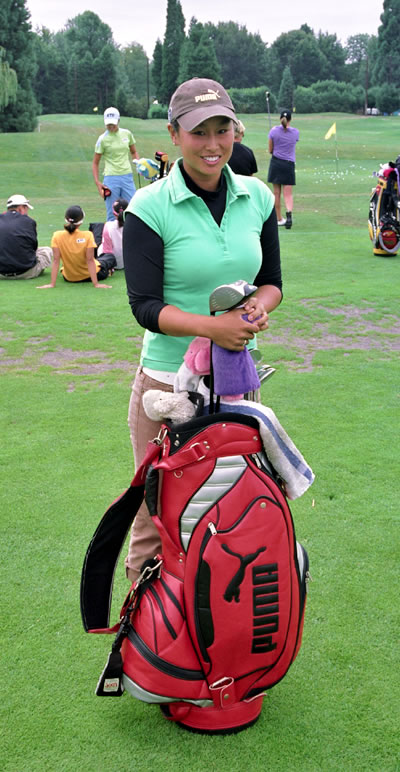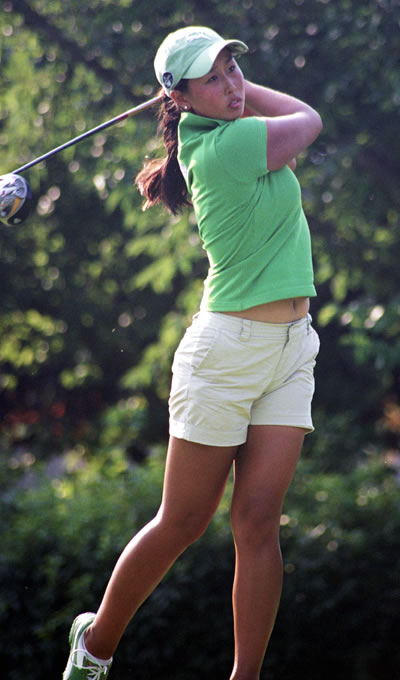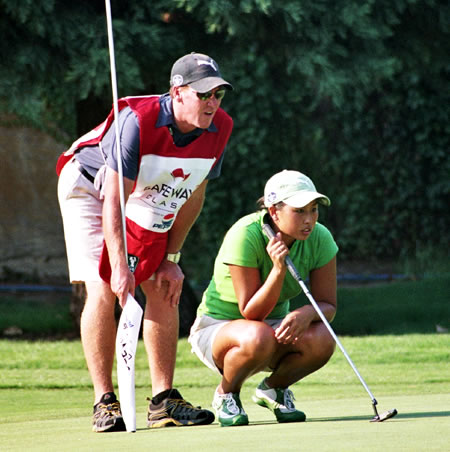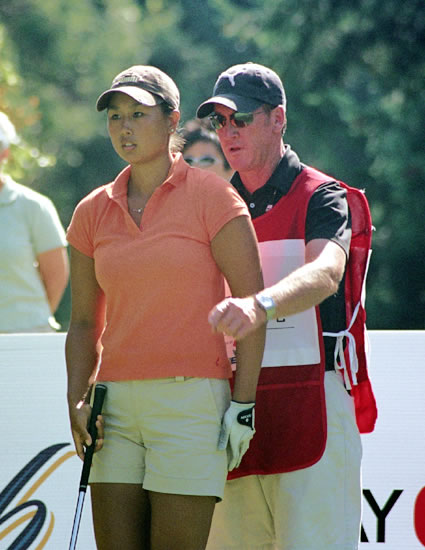 |
 |
 |
 |
 |
 |
Hana Kim Interview
 Seoul
Sisters Magazine: I guess I'll start with the simple questions
first. When did you start playing golf?
Seoul
Sisters Magazine: I guess I'll start with the simple questions
first. When did you start playing golf?
Hana Kim: I started playing when I was six years old.
SS: Wow! What motivated you to do that (at such a young age)?
HK: At the time, both my parents and my sister were playing. They
started me as well. My sister is a year younger. And we would go out to
play, have fun. Get to play as a family, which is fun. At the time I was
swimming, doing a bunch of other stuff, basketball, arts, piano. But golf
was always the most fun, because I got to spend time with my sister and
my parents.
SS: When did you start focusing on that?
HK: Well, I was competitive in other sports until I was probably
14 or 15. Especially swimming, I was a really big swimmer.
SS: What kind of stroke?
HK: I did everything. My best was sprint, 25, 50 meters. I did
the freestyle, backstroke and the breaststroke.
SS: I was butterfly (when I swam)
HK: See, I could never do the butterfly! It was too much…
I played my first golf tournament when I was about… eight. Eight
or nine. Somewhere around there.
SS: That was just for 8 to 10 year olds?
HK: It was 11 and under. At the time in Southern California (where
she grew up), I remember, at the first junior tournament my sister and
I played, there were three girls. I finished first, my sister finished
second, and the other girl finished third! And eventually we would show
up and my sister and I were the only girls in the 11 and under division.
And so, it was a lot of fun, because sometimes we would get bumped up
and play with the 12 to 14 year old girls. And they would kind of play
and be nice to us, you know, we weren't their competition at all. It was
basically my sister and I going out and playing golf at different country
clubs in the Los Angeles area. I played my first national AJGA event when
I was 13, I think. In Arizona. So there, I think, things started getting
a little more serious.
SS: And that's all the way up to 17 year olds?
HK: Yeah, I played (those) until I was probably 17 or 18, when
I left for college. It was weird. It was never a master plan for me to
turn pro, or to take golf as seriously as I have. It just seemed to be
a natural progression of life. I was lucky enough to be involved with
the sport young, and I really enjoyed playing with my parents and my sister,
and the country club that we were members at were really great in letting
us run around and be rugrats, goof off on the driving range… Because
it was fun, and there was no pressure to play, because of those two major
reasons, I continued to enjoy it and developed my game.
 SS:
Was there one tournament or moment where you felt, hey, I'm really
good at this sport?
SS:
Was there one tournament or moment where you felt, hey, I'm really
good at this sport?
HK: No, it was weird… It was almost one of those things where
I felt like, for a long time in my life, I led a double life. From September
to June I was a student, I had my school friends, none of whom were golfers.
I played basketball, I did this and that and the other, and made sure
I made good grades. And when school was out in June, until September again,
for those summer months, I was a golfer, and I had my golf friends, and
I focused only on golf. And so, it wasn't one of those things where I
really had time to internalize what was going on. One after another, I
was always so busy with something, that I never really had time to internalize,
'Wow, I'm really good at this! I could really go somewhere with this!'
I knew that when school got out, I got to play golf all the time. And
when summer was over, and it got too hot (sic), I got to start school
again, and I got to hang out with my friends. And it was just real nice,
it was kind of a routine in my life.
SS: Did you practice a lot even in the Winter?
HK: LA Winters are 75 degrees! Perfect, maybe (sometimes) overcast.
So it was great, there was never a time where there was a limitation on
when you could practice because of the weather. So it was year round,
and we could do it whenever we wanted, and we didn't have to do it if
we didn't want to do it.
SS: So there was no pressure on you from (your parents)?
HK: No, my parents are so easygoing! I feel so lucky, to have had
parents that were supportive, but never pushy, and who always made sure
I had fun. And who knew that winning wasn't everything. You know, winning
is not everything. Even now, I take a lot of pride in trying to
be somebody who my parents can be proud of. You know, a good friend to
the people out here, and a good role model for kids, somebody that is
approachable, and has honor, and all those qualities that I feel like
I learned when I was younger and I had to be a golfer. A big life lesson
learned, I think, along the way.
 SS:
Did you get a scholarship to college?
SS:
Did you get a scholarship to college?
HK: Yeah, I did. I played two years at Northwestern in Chicago,
and then I transferred after my sophomore year, and then I graduated two
years later from UCLA.
SS: Why did you transfer? Did you want to be back home?
HK: Well, when I originally went to Northwestern, I had no intention
of turning pro. I kinda thought, well, golf is fun, it's nice, but I really
want to be a lawyer. Northwestern is just a great academic school, and
has this great program that preps you for law school. And so I went. And
two year into it, I kinda missed the competition of golf. And so, my best
friend was at the time on the team at UCLA, Jeannie Umetz, and UCLA was
right near my house. They recruited me when I was coming out of high school.
So I called the coach, did the whole recruiting thing over again, and
luckily there was room on the team and she was happy to have me. You know,
it was tough. Not a lot of my credits transferred. So I didn't take summer
school, but I was able to graduate in four years, make up the required
time. I took five classes a quarter, and did a lot more work load. But
I was glad to have graduated in four (years), and worked hard while I
was doing it, so I could be out here to pursue what I wanted to do.
SS: Are you (still) thinking about being a lawyer (sometime
in the future)?
HK: You know, it's absolutely something that I'm not ruling out,
but right now I feel like, as long as my body can do it, I would like
to be out here and play golf. I really took care to make sure I made good
grades, and kept up with learning the routine of being in college. Because,
I've heard stories of people who go to college and the whole thing is
like a whirlwind. Then they got out, and felt like they didn't have focus
for the next three years. And I feel like, and you know I might be wrong,
but, two years out I feel like the biggest thing I learned in college
was getting into a routine, and understanding when something is told to
you the core concept instead of all the details necessarily. Because if
you're smart enough you can draw in from the core details what you need
to know. I don't know how valuable or not valuable that is, but I feel
like that's one of the biggest lessons I've learned, and that I've been
able to apply in my life so far. So hopefully in my forties or fifties,
or whenever the time comes when I happen to go to Law School or not, it's
something that I'll still be able to apply. But hopefully that's a long
time down the road!
SS: (laughs). Forties and fifties? Yeah, you have a while yet!
HK: (laughs)
 Q-School
Challenges
Q-School
Challenges
SS: You went to Q-School, and you got an exemption right off the
bat. That was your first time at Q-School, right?
HK: Yeah, that was my first time, right after I graduated college.
SS: Were you expecting for it to be that easy?
HK: Well, it wasn't easy, and in the finals at Q-School, I was
there for a week. Eight days I was there. In eight days I lost eight pounds.
SS: Oh my gosh!
HK: I was literally in full stress mode for ten days, because the
two days prior I didn't get any sleep. It was one of those things where,
I would wake up in the morning, I would play golf, play a round of practice,
go back to the hotel room, and it would be seven o'clock, and I was so
exhausted emotionally, physically, mentally exhausted, I would fall asleep
at 7:30.
SS: Sounds like that was different from any other tournament
you ever went to….
HK: Yeah, absolutely. I feel like the first time around, when I
went to Q-School, there's a certain naïveté, you know…
Where you feel like you understand the magnitude of what you are doing,
or the consequences of these five rounds, but you don't really. And so
it's just pure adrenaline I think that pushes you along. And I just had
to rely on the fact that I had practiced hard enough and that my whole
life was kind of culminating in this moment. And somehow I made it through…
it was difficult, but it was rewarding. It was a great experience. I think
I learned a lot about myself and my mental fortitude from that week. And
it was an invaluable experience, and hopefully after this week (at the
Safeway Classic), I will not have to go back again (laughs), so we'll
see!
SS: (laughs). How are you looking this year (2006)?
HK: Not great. My status this year… I haven't been able to
get into all my tournaments, so it's been difficult to get any rhythm.
I've been working hard, and my putting is really coming along. I've been
working really hard on my short game, and I'm hitting the ball really
well, so…
(as it turned out, Hana was only able to acquire nonexempt status at 2006
Q-School for the 2007 season)